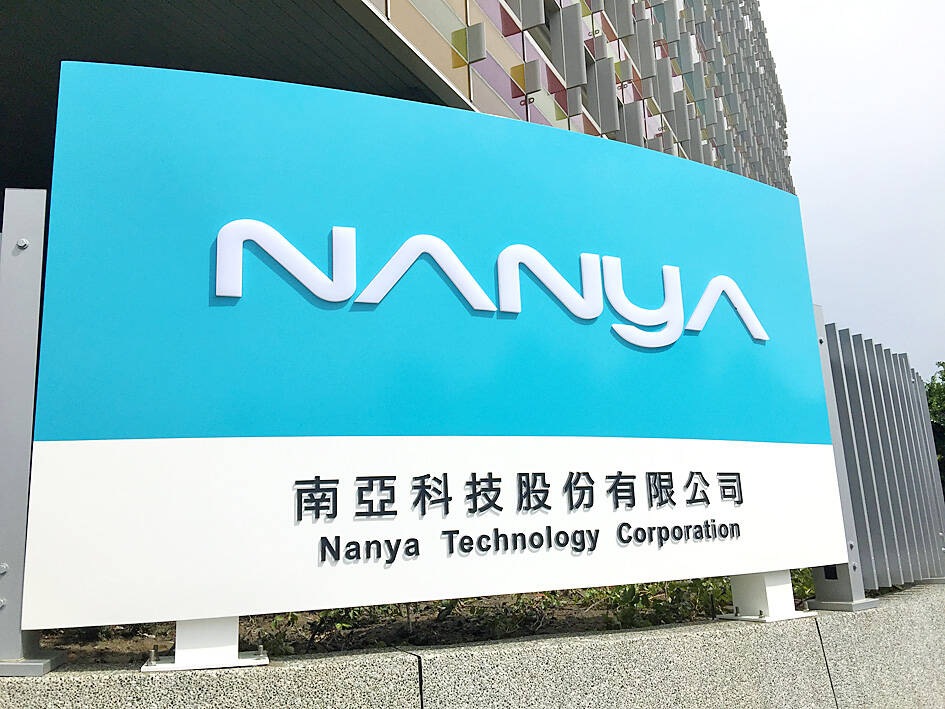Nanya Technology Corp (南亞科技) yesterday posted its ninth consecutive quarter of losses, but the world’s No. 4 DRAM chipmaker said it expects a pickup in demand next quarter for standard DRAM chips used in smartphones and consumer electronics.
The company said it has seen signs of a nascent recovery, after China introduced several economic stimulus packages to encourage consumer spending.
Major industry players, led by Samsung Electronics Co, also continue to reduce inventory, leading to better supply-demand dynamics, it said.

Photo: Grace Hung, Taipei Times
“We are expecting DRAM chips used in consumer electronics to be out of the woods in the second quarter and move toward a positive direction,” Nanya president Lee Pei-ing (李培瑛) told an online news briefing.
“The inventory of [memory chips for] smartphones is returning to a normal level in China. That will pave the way for an improvement in the supply-demand situation in the first half,” Lee said, adding that the firm expects a noticeable improvement in its bottom line in the final quarter of this year.
The company added that it is racing to produce more DDR5 DRAM chips to inject new growth. DDR5 chips, used mainly in computers and servers, enjoy a significant price premium compared with DDR4 chips.
“Nanya Technology will mainly rely on the new products — DDR5, DDR4 made on new, advanced technology, low-power DDR4 and low-power DDR5 memory chips — for bottom-line improvement, and there is a chance to see a marked improvement in the fourth quarter,” Lee said.
The company aims to boost the contribution of DDR5 chips to about 20 percent of overall DRAM production in the first half of this year.
For the full year, DDR5 chips are to account for 30 percent of its total production, Lee said.
The company has also partnered with Piecemakers Technology Inc (補丁科技) to develop high-bandwidth memory chips used in artificial intelligence-powered edge devices, Lee said, adding that it expects to ship its first high-bandwidth DRAM chips by the end of next year.
Nanya Technology last month announced that it would acquire up to 38 percent of Piecemakers’ shares for a maximum of NT$660 million (US$19.93 million), and spend NT$20 billion on new facilities and equipment this year, up from NT$16 billion last year.
The company’s net losses widened from NT$1.49 billion the previous quarter to NT$1.57 billion in the December quarter, amid sluggish demand and lower average selling prices.
On an annual basis, net losses improved from NT$2.48 billion.
Shipments last quarter sank 7 to 9 percent sequentially, or 31 to 33 percent annually, while selling prices dipped about 11 to 13 percent quarterly, but rose 11 to 13 percent annually, the company said.
As a whole, losses last year narrowed from NT$7.44 billion in 2023 to NT$5.08 billion, the company said.

SETBACK: Apple’s India iPhone push has been disrupted after Foxconn recalled hundreds of Chinese engineers, amid Beijing’s attempts to curb tech transfers Apple Inc assembly partner Hon Hai Precision Industry Co (鴻海精密), also known internationally as Foxconn Technology Group (富士康科技集團), has recalled about 300 Chinese engineers from a factory in India, the latest setback for the iPhone maker’s push to rapidly expand in the country. The extraction of Chinese workers from the factory of Yuzhan Technology (India) Private Ltd, a Hon Hai component unit, in southern Tamil Nadu state, is the second such move in a few months. The company has started flying in Taiwanese engineers to replace staff leaving, people familiar with the matter said, asking not to be named, as the

The prices of gasoline and diesel at domestic fuel stations are to rise NT$0.1 and NT$0.4 per liter this week respectively, after international crude oil prices rose last week, CPC Corp, Taiwan (台灣中油) and Formosa Petrochemical Corp (台塑石化) announced yesterday. Effective today, gasoline prices at CPC and Formosa stations are to rise to NT$27.3, NT$28.8 and NT$30.8 per liter for 92, 95 and 98-octane unleaded gasoline respectively, the companies said in separate statements. The price of premium diesel is to rise to NT$26.2 per liter at CPC stations and NT$26 at Formosa pumps, they said. The announcements came after international crude oil prices

A German company is putting used electric vehicle batteries to new use by stacking them into fridge-size units that homes and businesses can use to store their excess solar and wind energy. This week, the company Voltfang — which means “catching volts” — opened its first industrial site in Aachen, Germany, near the Belgian and Dutch borders. With about 100 staff, Voltfang says it is the biggest facility of its kind in Europe in the budding sector of refurbishing lithium-ion batteries. Its CEO David Oudsandji hopes it would help Europe’s biggest economy ween itself off fossil fuels and increasingly rely on climate-friendly renewables. While

SinoPac Financial Holdings Co (永豐金控) is weighing whether to add a life insurance business to its portfolio, but would tread cautiously after completing three acquisitions in quick succession, president Stanley Chu (朱士廷) said yesterday. “We are carefully considering whether life insurance should play a role in SinoPac’s business map,” Chu told reporters ahead of an earnings conference. “Our priority is to ensure the success of the deals we have already made, even though we are tracking some possible targets.” Local media have reported that Mercuries Life Insurance Co (三商美邦人壽), which is seeking buyers amid financial strains, has invited three financial